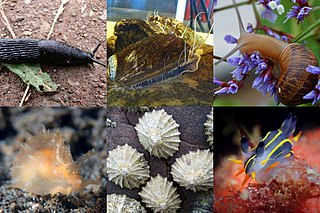
Gastropods, commonly known as slugs and snails, belong to a large taxonomic class of invertebrates within the phylum Mollusca called Gastropoda.

Amphibola crenata is a species of air-breathing snail with an operculum, a pulmonate gastropod mollusc which lives in a habitat that is intermediate between the land and the sea, not entirely terrestrial and not entirely marine. This is not a true land snail, but it is also not a true sea snail. Unlike almost all other snails that have opercula, this species breathes air. It is common in New Zealand.

Sea snail is a common name for slow-moving marine gastropod molluscs, usually with visible external shells, such as whelk or abalone. They share the taxonomic class Gastropoda with slugs, which are distinguished from snails primarily by the absence of a visible shell.
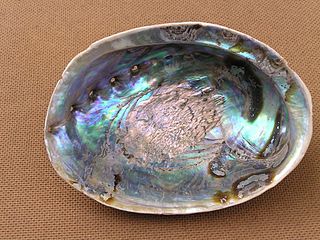
Pāua is the Māori name given to three New Zealand species of large edible sea snails, marine gastropod molluscs which belong to the family Haliotidae, known in the United States and Australia as abalone, and in the United Kingdom as ormer shells. Pāua has entered English through common use in the New Zealand English dialect, and is both singular and plural, following the grammar rules of its original language.

Scutus is a genus of large sea snails or limpets with the common name "shield shells". These are marine gastropod molluscs in the family Fissurellidae, the keyhole limpets and slit limpets.

Fissurellidae, common name the keyhole limpets and slit limpets, is a taxonomic family of small to medium-sized limpet-like sea snails, marine gastropod molluscs in the clade Vetigastropoda.
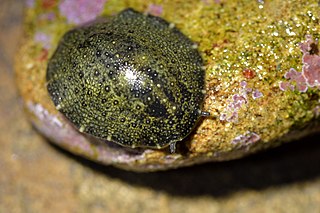
Onchidella nigricans is a species of small, air-breathing sea slug, a shell-less marine pulmonate gastropod mollusc in the family Onchidiidae.
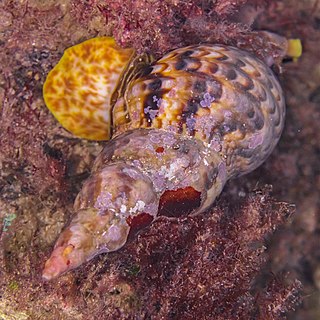
Charonia tritonis, common name the Triton's trumpet, the giant triton or pū is a species of very large sea snail, a marine gastropod mollusc in the family Charoniidae, the tritons. Reaching up to two feet in shell length this is one of the biggest mollusks in the coral reef.
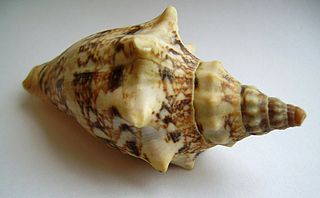
Alcithoe arabica, common name Arabic volute, is a species of very large sea snail, a marine gastropod mollusc in the family Volutidae, the volutes.
Nacella macquariensis is a species of true limpet, a marine gastropod mollusc in the family Nacellidae. It is found on the lower foreshore and in the shallow sub-littoral zone of certain islands in the southern Indian Ocean and Southern Ocean.

Notaspidea, also known as the sidegill slugs, is an artificial grouping of sea slugs which is now split into two unrelated groups, the Umbraculida and the Pleurobranchomorpha.

Umbraculum umbraculum, common name the umbrella slug, is a species of large sea snail or limpet, a marine gastropod mollusc in the family Umbraculidae. It is found in tropical to warm temperate parts of the Indo-Pacific and Atlantic Oceans, where it feeds on sponges.

Dolabrifera dolabrifera is a species of sea hare, a marine gastropod mollusc in the family Aplysiidae, the sea hares. Dolabrifera dolabrifera, otherwise known as a Warty Seacat. The animal goes by many names, including the common sea hare. The Hawaiian name for Dolabrifera dolabrifera, is Kualakai.

Pupa affinis is a species of small sea snail, a marine gastropod mollusc in the family Acteonidae. It is found in the waters around the North Island of New Zealand.

Calliostoma tigris, common name the tiger maurea, is a large species of sea snail, a marine gastropod mollusc in the family Calliostomatidae, the Calliostoma top snails.

Cellana radians, common name the radiate limpet, is a species of true limpet, a marine gastropod mollusc in the family Nacellidae, which is one of the true limpet families.

Scutus unguis, common name the northern duck's bill, is a species of large sea snail or limpet, a marine gastropod mollusk in the family Fissurellidae, the keyhole limpets and slit limpets.

Lunella smaragda, common name the cat's eye snail, is a species of sea snail, a marine gastropod mollusk in the family Turbinidae, the turban snails.

The subfamily Emarginulinae, common name keyhole limpets and slit limpets, is a taxonomic subfamily of limpet-like sea snails, marine gastropod molluscs in the family Fissurellidae, the keyhole limpets and slit limpets.



















